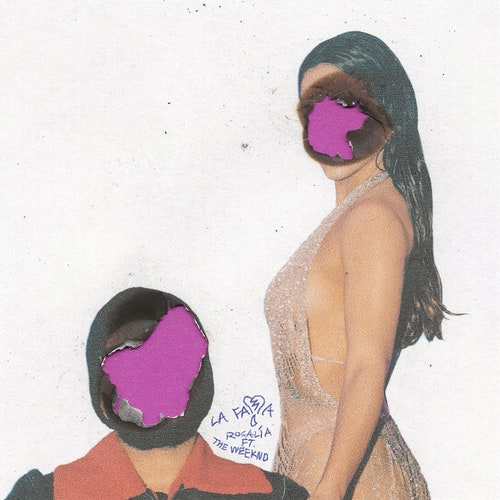
News
News Flash: Memory Shop and Anime Zakka to Open in Harvard Square

News
Harvard Researchers Develop AI-Driven Framework To Study Social Interactions, A Step Forward for Autism Research

News
Harvard Innovation Labs Announces 25 President’s Innovation Challenge Finalists

News
Graduate Student Council To Vote on Meeting Attendance Policy

News
Pop Hits and Politics: At Yardfest, Students Dance to Bedingfield and a Student Band Condemns Trump
‘La Fama’ Review: Rosalía and The Weeknd Pick Fame Over Love

“La Fama,” released on Nov. 11, is the first single from Spanish singer Rosalía's third studio album, “Motomami.” It features Canadian pop singer The Weeknd, who previously recruited Rosalía to feature on the remix of his chart-smashing track, “Blinding Lights.” In an interview with NMD, Rosalía revealed that the track was recorded long before “Blinding Lights,” dating back almost three years.
“La Fama” is nothing like the other collaboration between the two, the attention to detail on its production being its main novel attribute.
Translated as “The Fame,” “La Fama” entails a tragic love story that sees the singers lose their lovers to the time-consuming music industry. The song is narrated as a story within a story, where Rosalía hands it off to The Weeknd to voice what her lover once said to her. For example, when Rosalía characterizes her fixation on fame as “something that was bad for him” in the opening verse, The Weeknd answers that sentiment from the perspective of the lover in the chorus, “Fame is a bad lover and she won't truly love you.” Here, fame and true love are juxtaposed and counterproductive to one another with the use of the feminine pronouns to personify fame and the imperative tense in “nunca la vayas a casar,” or “don't you dare marry her,” marking the lover’s response. That push-and-pull feeling echoes throughout the song, climaxing at the bridge when both vocalists sing that there’s no escaping fame’s hold on them, even if it comes at the price of letting “the one” get away. The lyrical cohesiveness here makes the story come full circle, the narrators’ fame ending what once was a promising love with heartbreak.
Latin American bachata is the perfect vehicle to narrate such a tragically sexy love story. The four instrumental core rhythms are the driving force on the track. There’s the deep thrum of the bongó on the first, third, and fourth beats keeping the tempo slow and steady. The rattling of the güira dressing up the percussion that syncopates the requinto (lead guitar). These elements are all very textbook traditional bachata, keeping the spirit of the song sensual and rhythmic. With Spanish producers like Tainy working on the bass production and the insertion of synthesizer elements in The Weeknd’s chorus, however, the song feels authentic yet modern. Each of these instrumental introductions continue throughout, only diminishing into the background in pivotal thematic moments, like the pause between the bridge and the chorus that lets the ad libs come to the foreground. This natural progression of the beat is dynamic enough that it doesn’t leave the listener wanting for something drastic like a beat drop, which would have interrupted the continuity of the lyrics.
Rosalía has stepped outside of her comfort zone on this track, seeing as she is more familiar with heavy reworked beats and neo-pop styles in her discography thus far. The artist mentioned to NMD that the inspiration to do bachata on this single came from the Spanish legend Romeo Santos, a pioneer of the genre. It is highly commendable that in her first attempt at the style, Rosalía produced something that sounds as classic yet innovative as “La Fama.”
The Weeknd evidently also put in the time-consuming work to learn the Spanish lyrics, singing fluidly and fluently in a language foreign to him. This feat is almost as impressive as the challenge of getting a foreign singer who is wildly famous for his own distinctive synth-pop style to sing bachata in a way that sounds natural and not forced. Not only did he have to acclimate to a rhythm stripped bare, but he also had to let go of all of his signature reworked voice effects that can be heard in the breathy vocals on his latest project “After Hours.” Safe to say, The Weeknd is a musical chameleon, working hard to add his unique flair to this track without imposing too much of his own production style upon it.
“La Fama” exceeds expectations as the first single from “Motomami,” advertising it as a very promising album if this same meticulous approach was applied in its making.
— Staff writer Alisa S. Regassa can be reached at alisa.regassa@thecrimson.com. Follow her on Twitter at @alisaregassa.
Want to keep up with breaking news? Subscribe to our email newsletter.
Most Read
- Stop-Work Orders Roll In for Harvard Researchers After $2.2 Billion Pause in Federal Funds
- Trump Threatens To Revoke Harvard’s Tax-Exempt Status One Day After Garber Rejects Demands
- Trump’s Demands to Harvard, Analyzed
- Harvard Will Fight Trump’s Demands
- Trump Administration Freezes More Than $2 Billion in Federal Funding to Harvard
From Our Advertisers

Over 300+ courses at prestigious colleges and universities in the US and UK are at your disposal.

Where you should have gotten your protein since 1998.

Serve as a proctor for Harvard Summer School (HSS) students, either in the Secondary School Program (SSP), General Program (GP), or Pre-College Program.

With an increasingly competitive Law School admissions process, it's important to understand what makes an applicant stand out.

Welcome to your one-stop gifting destination for men and women—it's like your neighborhood holiday shop, but way cooler.

HUSL seeks to create and empower a community of students who are seeking pathways into the Sports Business Industry.
